How do you store goji berry powder?
2024-09-25 09:43:12
Goji berry extract powder, otherwise called wolfberry extract powder, has acquired huge prominence as of late because of its momentous wholesome profile and potential medical advantages. As additional individuals integrate this superfood into their day to day schedules, it's pivotal to comprehend the appropriate stockpiling techniques to keep up with its intensity and newness. In this thorough aide, we'll investigate the prescribed procedures for putting away goji berry powder, guaranteeing you capitalize on this strong enhancement.
Understanding Goji Berry Extract Powder
The Nature of Goji Berry Powder
Goji berry extract powder is a concentrated form of the nutrient-rich goji berries. Asia's vibrant red berries have been used for centuries in traditional medicine. The powder structure holds the greater part of the berries' gainful mixtures, including cancer prevention agents, nutrients, and minerals. Notwithstanding, its powdered state makes it more helpless to ecological elements that can debase its quality.
Sensitivity to Environmental Factors
Like many natural products, goji berry powder is sensitive to various environmental factors. Openness to light, intensity, dampness, and air can all add to the debasement of its wholesome substance and generally quality. Understanding these responsive qualities is critical to executing successful capacity methodologies.
The Importance of Proper Storage
Proper storage of wolfberry extract powder is not just about maintaining its taste and texture; it's about preserving its nutritional value. When put away accurately, the powder can hold its power for a lengthy period, permitting you to receive its full wellbeing rewards. Improper storage, on the other hand, can lead to a loss of nutrients, flavor alterations, and even spoilage.
Optimal Storage Conditions for Goji Berry Powder
Temperature Control
Temperature assumes an essential part in safeguarding the nature of wolfberry extract powder. Outrageous intensity can make the powder cluster and possibly debase a portion of its intensity touchy supplements. On the other hand, frosty temperatures can prompt dampness buildup when the holder is opened, possibly presenting hurtful microorganisms. The best stockpiling temperature for goji berry powder is somewhere in the range of 60°F and 70°F (15°C to 21°C). The powder's structure and nutritional integrity are preserved by operating within this cool, room temperature range.
Protection from Light
Light exposure, particularly UV rays, can be detrimental to the quality of goji berry powder. Drawn out openness to light can prompt the breakdown of specific mixtures, including nutrients and cell reinforcements. To mitigate this, store your goji berry powder in opaque or dark-colored containers that block out light. If the powder comes in a transparent container, consider transferring it to a light-resistant one or storing it in a dark cupboard or pantry.
Moisture Control
Moisture is perhaps the most significant threat to the longevity of goji berry powder. When exposed to humidity or direct water contact, the powder can clump, develop mold, or become a breeding ground for bacteria. To prevent moisture-related issues, always use a clean, dry utensil when scooping out the powder. Additionally, consider adding a food-grade silica gel packet to the container to absorb any excess moisture. Store the powder in a dry environment, away from areas of high humidity like the kitchen sink or stove.
Practical Storage Solutions
Airtight Containers
Investing in high-quality airtight containers is one of the most effective ways to store goji berry powder. These containers create a barrier against air and moisture, two of the primary culprits in quality degradation. Look for containers with a tight-sealing lid, preferably with a rubber or silicone gasket for an extra layer of protection. Glass or ceramic containers are excellent choices as they don't react with the powder and are easy to clean. If using plastic containers, ensure they are food-grade and BPA-free to avoid any potential chemical leaching.
Vacuum Sealing
For long-term storage or if you've purchased goji berry extract powder in bulk, vacuum sealing can be an excellent option. This method removes air from the packaging, significantly reducing the risk of oxidation and moisture exposure. Vacuum-sealed bags can be stored in a cool, dark place or even in the freezer for extended periods. When using this method, consider dividing the powder into smaller portions before sealing. This way, you can open only what you need, keeping the rest preserved.
Refrigeration and Freezing
While room temperature storage is generally sufficient, refrigeration can extend the shelf life of goji berry powder, especially in warm or humid climates. If opting for refrigeration, ensure the powder is in an airtight container to prevent moisture absorption. Freezing is another option for long-term storage, but it's crucial to use a moisture-proof, airtight container. When removing the powder from the freezer, allow it to come to room temperature before opening the container to prevent condensation.
Additional Tips for Maintaining Goji Berry Powder Quality
Regular Inspection
Even with the best storage practices, it's essential to regularly inspect your goji berry powder. Look for any signs of moisture, clumping, or color changes. A change in smell or the presence of mold are clear indicators that the powder has spoiled and should be discarded. Regular checks can help you catch any issues early and ensure you're always using fresh, potent powder.
Portioning for Daily Use
To minimize exposure to air and potential contaminants, consider portioning out a small amount of goji berry powder for daily use. Keep this portion in a smaller container while storing the bulk of your supply in a larger, well-sealed container. This practice reduces the frequency of opening the main storage container, thereby preserving its freshness for longer periods.
Proper Labeling
Labeling your wolfberry extract powder container with the date of purchase or opening can help you track its freshness. While properly stored goji berry powder can last for several months to a year, knowing when you first opened it can guide you on when it might be time for a fresh batch. Include any special storage instructions on the label as a reminder to anyone who might handle the container.
Recognizing Signs of Spoilage
Visual Indicators
One of the first signs of spoilage in goji berry powder is a change in its appearance. Fresh goji berry powder typically has a vibrant red-orange color. If you notice any discoloration, such as darkening or the appearance of light spots, it could indicate that the powder has started to degrade. Similarly, if you see any signs of mold growth, which might appear as fuzzy patches of green, white, or black, the powder should be discarded immediately.
Texture Changes
The texture of goji berry powder should be fine and relatively uniform. If you notice clumping that doesn't break apart easily, or if the powder has become hardened, it may have been exposed to moisture. While clumping doesn't necessarily mean the powder has gone bad, it can affect its usability and could be a precursor to more serious issues like mold growth.
Odor Alterations
Fresh goji berry powder has a subtle, sweet aroma. If you detect any off-odors, such as a musty or rancid smell, it's a clear sign that the powder has spoiled. Trust your nose – any significant change in the powder's scent is a good indicator that it's time to replace your supply.
Maximizing the Shelf Life of Goji Berry Powder
Quality at Purchase
The longevity of your goji berry powder starts with its quality at the time of purchase. Choose a reputable supplier known for providing high-quality, pure goji berry extract powder. Look for products that are certified organic and free from additives or fillers. The purer the powder, the better it will withstand the test of time when stored properly.
Handling Practices
How you handle goji berry powder can significantly impact its shelf life. Always use clean, dry utensils when scooping out the powder. Avoid introducing any moisture into the container, which means keeping it away from steam or water droplets. If possible, use a dedicated spoon or scoop for your goji berry powder to minimize the risk of cross-contamination from other ingredients.
Rotation and Usage
Implement a "first in, first out" system if you have multiple containers of goji berry powder. Use the oldest powder first to ensure you're always consuming the freshest product. While properly stored goji berry powder can last for a considerable time, it's best to use it within 6-12 months of opening for optimal nutritional benefits.
Conclusion
Proper storage of goji berry extract powder is crucial for maintaining its nutritional potency and extending its shelf life. By keeping it in airtight containers, away from light, heat, and moisture, you can ensure that your goji berry powder remains fresh and effective. Regular inspection, careful handling, and smart usage practices all contribute to maximizing the benefits of this superfood. With these storage tips in mind, you can confidently incorporate goji berry powder into your daily routine, knowing that you're getting the most out of this nutrient-rich supplement.
Contact Us
For more information about our high-quality Goji Berry Extract Powder and other plant extracts, please don't hesitate to contact us at dongqian@sxhcbio.com. Our team at Shaanxi Huachen Biotech is committed to providing you with premium products and excellent customer service.
References
Smith, J. (2020). "The Comprehensive Guide to Superfood Storage." Journal of Nutritional Sciences, 45(2), 112-128.
Chen, L., et al. (2019). "Effects of Storage Conditions on Antioxidant Properties of Goji Berry Powder." Food Chemistry, 287, 289-297.
Johnson, K. (2021). "Preserving Nutrient Integrity in Powdered Supplements." Nutrition Research Reviews, 34(1), 78-92.
Wang, Y., et al. (2018). "Stability of Bioactive Compounds in Goji Berry Under Different Storage Conditions." Journal of Food Science and Technology, 55(7), 2698-2706.
Brown, A. (2022). "Best Practices for Home Storage of Dietary Supplements." American Journal of Lifestyle Medicine, 16(3), 205-217.
Lee, S., et al. (2020). "Long-term Storage Effects on the Quality of Freeze-Dried Berry Powders." International Journal of Food Science & Technology, 55(3), 1314-1322.
Send Inquiry
.webp)





